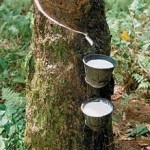The global demand for natural rubber and the increasing market price which has reached to ₱100 (US$ 2.50) per kilogram for the last two years have motivated local natural rubber farmers to expand their agribusiness investments by targeting 200,000 hectares planted with rubber by 2016.
The Department of Trade and Industry (DTI) aims to expand the domestic market for natural rubber, and provide investment and marketing opportunities in the country’s rubber industry.
Currently the Philippines contributes a little over 1 percent of the entire world’s production of rubber with yield coming from small-farm owners with only three to ten hectares of farmland.
With the growing global demand for rubber, the country’s production is expected to grow by 3.7 percent in the next ten years.
“We envision the Philippines as one of the major natural rubber producing countries in Asia. We are targeting to double the Philippine rubber industry’s production in 2010 and supply 50 percent of domestic natural rubber requirements by 2016,” Trade Undersecretary Merly Cruz said.
“We need to take advantage of the present opportunity in rubber and note that the Asia-Pacific is expected to continue to have the lion’s share in the production,” Secretary of Agriculture Proceso J. Alcala confided.
A report from the DTI shows that seventy percent of natural rubber is used as raw material for rubber tires. The remaining 18 percent goes to shoe manufacturing and non-tire industrial uses such as hose, belts and vibration mounts, and 12 percent goes to gloves manufacturing industries.
The Department of Agriculture (DA) chief is confident that the country can become a major player soon in the region because of the vast areas allocated for rubber production and the adequate technical knowledge made available to the local rubber planters.
Currently, there are natural rubber producers in the six regions in Mindanao and two regions in Luzon directly sell their produce to traders, buying agents of exporters and processors.
The government’s national program on rubber caters to the needs of the smallholders to enable them to meet the challenges in production, post-production and marketing of their produce.
Current interventions have increased yield and intensified production of quality planting materials as well as empower producers to supply quality raw processed products.
The DA is set to improve the quality of produce using new technology and upgrade dilapidated processing facilities and provide cooperatives access to financing, infrastructure, and other support services.
A joint statement of commitment to support the Philippine rubber industry development was signed by government agencies, government finance institutions (GFIs), and rubber industry stakeholders in order to achieve these goals, according to the DTI.
The statement of commitment recognizes the extent of market and business opportunities in the country’s rubber industry.
These opportunities if strengthened are expected to generate investments’ increase domestic and export sales, and create job opportunities that will contribute to the country’s inclusive growth and poverty alleviation, according to the DTI.
